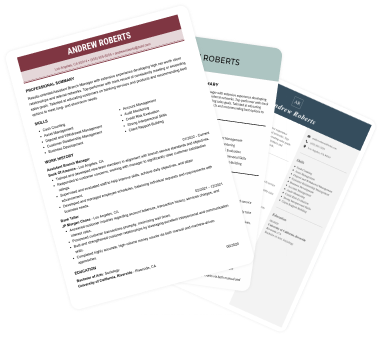
How to Write a CV in 2026: Tips, Templates & Examples
Learn how to write a CV in a few steps. Make a good CV for the UK job market following a dedicated CV template, expert tips, and examples.
December 15, 2025
Last updated on 13 November, 2025
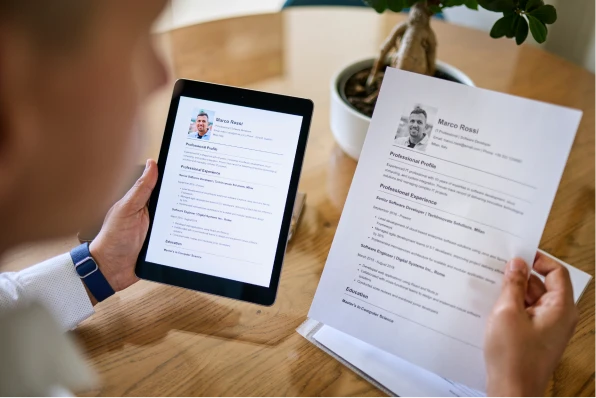
Trying to guesstimate where your CV will fall on a scale of best to worst in a given recruitment process can be a great way to waste energy, but there are some extremely useful questions this kind of thinking can raise. Some of the CVs will be terrible—that’s a given—most will be average, and some will be great.
So we have the question of what makes a good CV. Layout? Content? What is it that the best CVs have in common? Because if you don’t know the answers to these questions, it’s very likely your CV won’t be up there amongst the best. And in a competitive labour market you have to be at the top to be in the game.
A good CV is a concise document that is easy on the eye. It means you need to take care of both the content and the layout of your CV. It is recommended not to make it too long. One or two pages should be enough. The key to writing a good CV is tailoring it to the position you’re applying for. Here’s how to do it right.
Create an effective CV in minutes. Choose a professional CV template and fill in every section of your CV in a flash using ready-made content and expert tips.
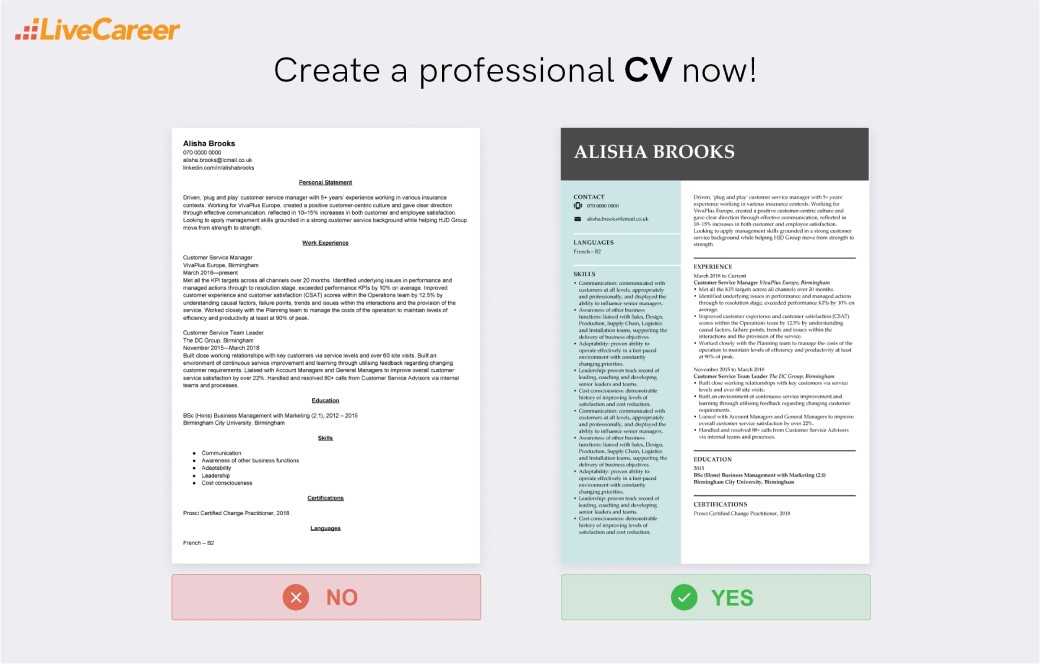
We created the sample on the right using our builder. See other good CV examples like this one.
Need some extra guidance on CV writing? Check these guides:
Alisha Brooks
070 0000 0000
alisha.brooks@lcmail.co.uk
linkedin.com/in/alishabrooks
Personal Statement
Driven, ‘plug and play’ customer service manager with 5+ years’ experience working in various insurance contexts. Working for VivaPlus Europe, created a positive customer-centric culture and gave clear direction through effective communication, reflected in 10–15% increases in both customer and employee satisfaction. Looking to apply management skills grounded in a strong customer service background while helping HJD Group move from strength to strength.
Work Experience
Customer Service Manager
VivaPlus Europe, Birmingham
March 2018—present
Customer Service Team Leader
The DC Group, Birmingham
November 2015—March 2018
Education
BSc (Hons) Business Management with Marketing (2:1), 2012 – 2015
Birmingham City University, Birmingham
Skills
Certifications
Prosci Certified Change Practitioner, 2018
Languages
French – B2
The first decision you need to make will affect how your CV looks at arm’s length, what information it emphasises, and how it’s read by people and parsed by ATSs (Applicant Tracking Systems). ATSs are the de facto digital gatekeepers of the application process and should be taken into account.
There are three main CV formats to choose from: chronological (i.e. reverse-chronological, or traditional), skills-based (or functional), and combination (or hybrid). The names of these formats already tell us a lot about them, and as its name suggests, a combination CV format is just a hybrid of the first two.
A chronological CV format is by far the most commonly used and the one that’s preferred by recruiters. It’s also most readily parsed by ATSs. It focuses on your work history first and foremost and goes into the most detail regarding your experience. This article assumes a chronological format.
A skills-based CV format is different: it focuses on your skills first and foremost, only briefly outlining your work history. This format is recommended for freelancers and workers of the so-called gig economy. It’s also a solid choice for career changers and military personnel transitioning back into civilian life.
There’s also the academic CV format, which differs significantly from the three above and is reserved for university teaching and research staff. Civilian, non-academic workers should stick with a (reverse-)chronological format unless their circumstances compel them to go with one of the others.
Choosing the right CV format is a single, relatively big decision, but what makes a good CV is also a series of many small decisions. These small decisions add up to the big picture of your CV—from how clear and easy to navigate your CV is to what it says about your English skills and attention to detail.
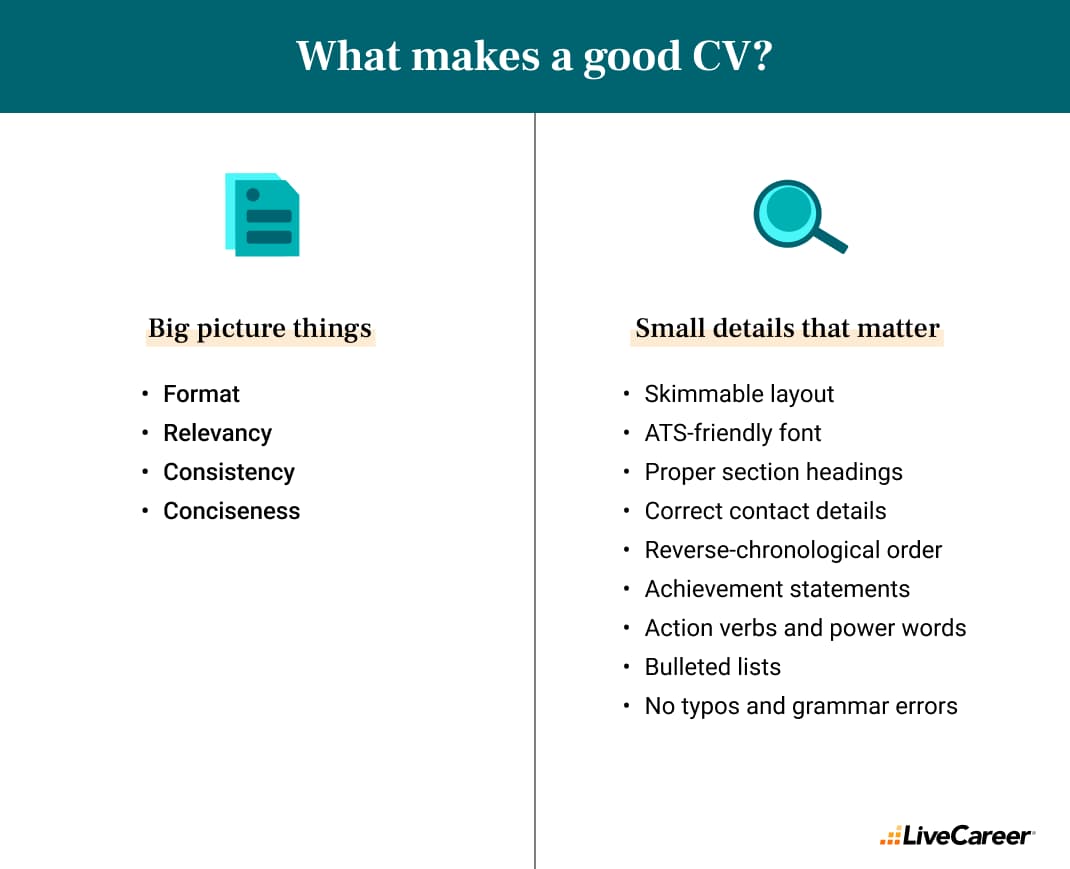
Make sure your personal details are clear and easy to find by leaving them near the top of your CV. Use subheadings and as much white space as you can muster to visually break your CV down into sections and subsections. Choose an appropriate CV font and leave the size locked in at 11–12 points.
A good CV is the one that gets you an invitation to a job interview. It can’t do this if no one even lays eyes on it. It’s the job of a good cover letter to ensure that your CV gets read. Always include a cover letter unless you’ve specifically been asked not to.
Stick to a maximum CV length of one page for every decade of experience, but don’t exceed two pages even if you have over two decades of experience. Proofread and spellcheck both your CV and cover letter until you’re absolutely certain they’re word-perfect. Ideally, use a dedicated CV builder to streamline the process, or consider hiring a professional CV writer for expert assistance.
Save or export your job application documents in PDF unless you’ve been asked for something else. PDF will help preserve much of what makes a good CV layout. Follow up if you haven’t heard back after a week with a quick call or email, it’s a simple gesture that could really pay dividends.
What makes a good CV? A good CV, above all, grabs recruiters’ attention from the outset and compels them to read on. You can achieve this by starting off with a personal statement (CV profile) that efficiently introduces you as a worker, shows what you have to offer the company, and describes how your goals line up with the company’s stated goals.
An overly long CV introduction is unlikely to get read to the end and might discourage a recruiter from reading it at all, so keep yours to only 3–4 sentences, 50–150 words. Introduce yourself by mentioning your experience and the industries or fields in which you got it. Then show what you have to offer.
Do this by showing what you managed to achieve for your current or previous employers. Describe some actions you took at work together with the benefits that went to your employer as a result. If your actions were in response to a problem or challenge, then briefly describe it, too. Use something like the CAR (Challenge-Action-Result) method.
It’s extremely important that you quantify everything you can when describing such achievements, focusing on the benefits your employer gleaned from your actions first and foremost. It’s totally fine to estimate these benefits and other aspects of your achievements, but keep these estimates realistic.
Make it clear that your goals line up with the company’s goals. This is easier to do than you might think. Simply answer the question: what do you hope to be able to achieve for your potential new employer? And viola, your goals now align with the company’s (do some background research to find out what they need).
Keep ATS algorithms happy by mentioning the name of the company to which you’re applying in your personal statement as well as the position to which you’re applying (exactly how it’s referred to in the job advert). Try to mirror the keywords used in the advert as well, but don’t overdo it.
Your personal statement goes first in your CV and will most likely be read first, but it’ll be best if you write it last (it’s basically a CV summary). You’ll be able to do a much better job once you’ve gone through preparing your job descriptions and skills section.
Driven, ‘plug and play’ customer service manager with 5+ years’ experience working in various insurance contexts. Working for VivaPlus Europe, created a positive customer-centric culture and gave clear direction through effective communication, reflected in 10–15% increases in both customer and employee satisfaction. Looking to apply management skills grounded in a strong customer service background while helping HJD Group move from strength to strength.
A strong CV summary will convince the recruiter you’re the perfect candidate. Save time and choose a ready-made personal statement written by career experts and adjust it to your needs in the LiveCareer CV builder.
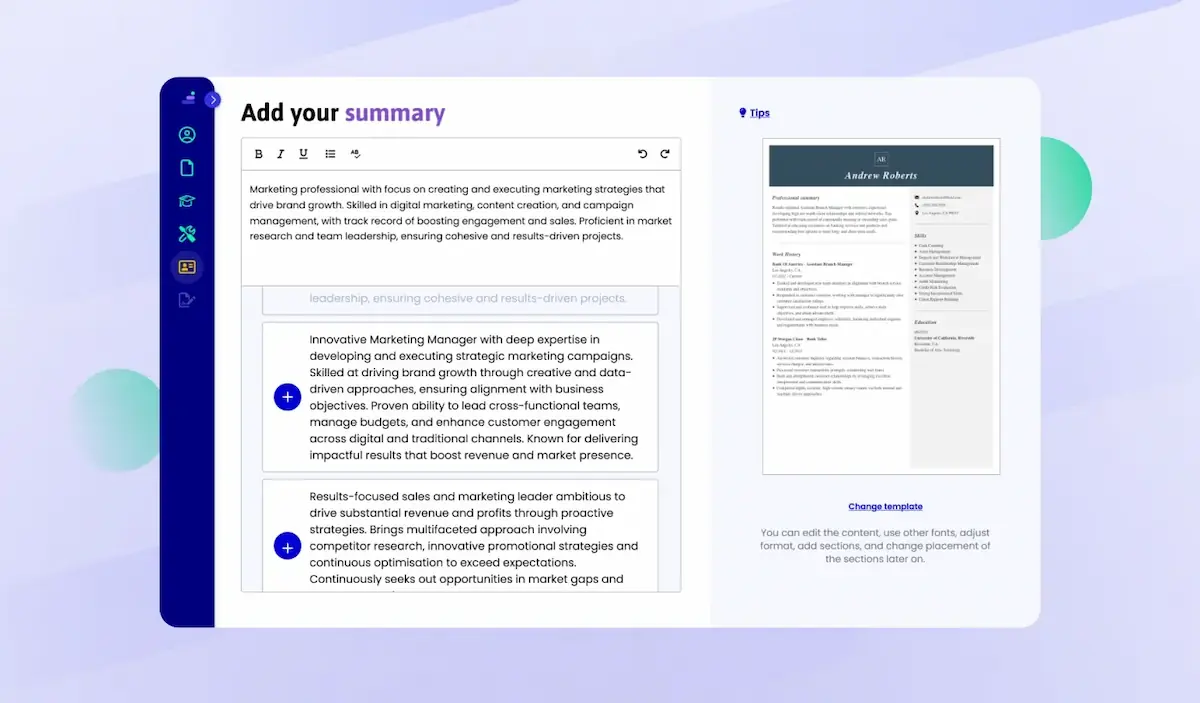
Recruiters’ eyes will be drawn to your work experience section thanks to the chronological CV format placing such a strong emphasis on it. Make sure it shines in the limelight: a lot of what makes a good CV is concrete information and hard data—facts that speak for themselves and a
good layout.
Use the template below to generate a subheading for each job description. Put these subheadings in reverse-chronological order and populate each job description with up to six achievements in bullet-point form.
[Job Title]
[Company Name, Location]
[Dates of Employment]
If you’re wondering what makes a good CV when you don’t have any work experience (and probably writing your first CV), then focus on any internships, placement work, and volunteer work you’ve done recently. Failing that, consider writing a student CV instead—it’ll be more suitable for your circumstances.
Customer Service Manager
VivaPlus Europe, Birmingham
March 2018–present
Customer Service Team Leader
The DC Group, Birmingham
November 2015–March 2018
Whether a specific academic qualification is required or not, and especially if it is, your education section is an important part of any good CV. List your academic qualifications in reverse-chronological order, starting from the most recent and working your way back from there.
You can skip over your high school education if you have more than one degree or any post-secondary qualification and a few years of work experience under your belt. Your education section is a matter of ‘less is more’, so keep to the templates below and don’t add any information not mentioned in them.
Use the following template to list both university degrees and other tertiary qualifications:
[Degree Type] [Degree Name](Degree Class), [Years Attended]
[Institution Name], [Institution Location]
If you don’t have a university degree, then use the following templates to detail your high school education:
A-levels: [Subject Name 1], [Subject Name 2], [Subject Name 3]
[School Name], [School Location], [Years Attended]+
[the number of GCSEs you completed] GCSEs (including Mathematics and English)
[School Name], [School Location], [Years Attended]
If you’re still completing a qualification, then include an expected graduation date. If you’ve just graduated from university or just finished school and don’t have much experience yet, then position this section above your work experience section. You may also find a graduate CV more suitable.
BSc (Hons) Business Management with Marketing (2:1), 2012 – 2015
Birmingham City University, Birmingham
You want whoever picks up your CV to feel like you’re exactly what they’ve been looking for. They should feel as though you wrote your perfect CV specifically for them and the position they’re trying to have filled. This is what makes a good CV and there’s a very simple way you can achieve it.
The secret is that there is no secret—you’ll just have to tailor your CV to each and every new application. When it comes to the skills section, you can make sure that it’s tailored to each job advert by copying a new set of skills backed up by solid evidence from a master list that contains all your skills.
So Step One becomes creating a suitable master list. Open a new document and start listing as many of your work-specific skills as you can. Once you’ve got as many as you can come up with (hard and communication skills), go back to the beginning and add a sentence onto each skill that describes how you’ve demonstrated that skill at work.
Any skill that you can’t back up with a sentence like this gets removed from your list. Save this document as your skill master list. Now it’s time for Step Two: go back to the job advert and copy 5–10 skills into your CV, at least covering those required in the advert. This will leave you with a tailored skills section.
When it comes to what makes a good CV, layout has a big part to play. Few people realise they can adapt the contents of their CV to suit their needs, though. Changing the order of or removing sections is generally a bad idea, but there are many potential benefits to tacking additional sections onto your CV.
You could add sections that cover any of your additional qualifications, accolades, awards, even your hobbies and interests. Not many people do this and yet it can make such a huge difference. Just keep it professional and directly relevant to the job at hand, and you can hardly go wrong.
One thing that can seemingly bend the above rule regarding relevance is the ability to speak a foreign language. This is proven to have many benefits and employers know they can capitalise on these benefits. So always include a section on languages if you do in fact speak one or more language other than English.
Certifications
Prosci Certified Change Practitioner, 2018
Languages
French – B2
You don’t have to be a CV writing expert. In the LiveCareer CV builder you’ll find ready-made content for every industry and position, which you can then add with a single click.

I hope you now have a better idea of what makes a good CV, and the confidence to write one yourself. Feel free to drop us a line in the comments section below. We’d love to field any questions you might have as well as reading your feedback and any job-hunting experiences you’d like to share.
Our editorial team has reviewed this article for compliance with LiveCareer’s editorial guidelines. It’s to ensure that our expert advice and recommendations are consistent across all our career guides and align with current CV and cover letter writing standards and trends. We’re trusted by over 10 million job seekers, supporting them on their way to finding their dream job. Each article is preceded by research and scrutiny to ensure our content responds to current market trends and demand.
Category: CV Help
Crafting a job-winning CV is all about showcasing your unique skills and experiences. Start with a strong personal statement that highlights your career goals and achievements.
Try Our CV Builder Now